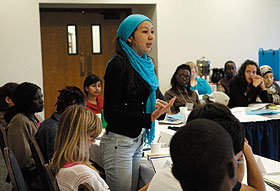  |
| HOME | THIS ISSUE | CALENDAR | GRANTS | BACK ISSUES | < BACK | NEXT > |
Young human rights leaders learn about global activism at week-long forum by Colin Poitras - August 25, 2008 | ||||
| After spending a week participating in the University’s fourth annual international forum on human rights and leadership, Abiodun Bakare was full of energy and excitement. “It’s a very good experience, where young leaders are able to network and learn about what others are doing,” said Bakare, of Nigeria, who was making his first trip to the United States to attend the forum. “It is wonderful seeing people of different races, ethnicities, and color talking, laughing, and sharing ideas,” Bakare, 29, said. Bakare already has a few ideas of his own. In Nigeria, he regularly helps a child welfare organization with fund raising and serves as a consultant to non-profit organizations through his Hum Creativity Point Foundation. Bakare was one of more than 70 individuals from 55 countries who attended this year’s International Leadership Programme: A Global Intergenerational Forum sponsored by the University’s UNESCO Chair and Institute of Comparative Human Rights. UNESCO stands for United Nations Educational, Scientific, and Cultural Organization. Institutions, organizations, and states affiliated with UNESCO seek to contribute to international peace and security by promoting collaboration among nations through education, science, and culture. The UNESCO human rights chair at UConn is the only one in the United States. The forum focuses on the intergenerational sharing of knowledge and building leadership skills. One of its primary goals is to nurture and develop young people to prepare them for local and global leadership and to create a network of solidarity in the development of human rights around the world, says Amii Omara-Otunnu, UNESCO Chair in Comparative Human Rights. Participants in this year’s forum were selected from among 700 applicants, based on their prior commitment to human rights work, the strength of their application essay, and their potential contribution to the forum. Organizers tried to select a balanced slate of candidates from diverse regions, backgrounds, genders, and ages. Those selected came from Kazakhstan, Lebanon, Kenya, Burma, Mexico, France, the Philippines and many other countries. They relied on philanthropy in their native countries, self-funding, and assistance from their embassies or nongovernmental organizations to underwrite the cost of attending the forum. This year’s keynote speaker was Ahmed Kathrada, a South African anti-apartheid activist who served 26 years as a political prisoner with Nelson Mandela. Kathrada spoke about the importance of unity and communication in helping oppressed people. Another of the forum’s guest speakers, Krishna Sondhi, founder of Kumarian Press, said she was impressed by the level of interest on behalf of the participants. Many gathered around her after she spoke, pressing her with questions and seeking her guidance.
“I’m so encouraged to see so many young people who are going to contribute to the fight for human rights,” said Sondhi, 72, who has fought sexism and discrimination in Kenya and elsewhere for decades. Kumarian Press, based in Virginia, publishes books on international development and management geared toward developing countries. In order to foster their leadership skills, participants took part in a ropes challenge course at the Holiday Hill Day Camp in Mansfield. They also toured the anti-poverty organization FoodShare of Hartford and visited the United Nations headquarters in New York. Joseph Briody, associate director of student development and learning at UConn, spoke about acquiring leadership skills for social action. Rafael Pérez-Escamilla, a UConn professor of nutritional sciences and public health, spoke about human rights, nutrition, and hunger; and Joyce Ashuntantang, an assistant professor-in-residence in English literature at the Greater Hartford Campus, shared her thoughts on the use of theatre in human rights education. Charles Prewitt, emeritus professor of physics, captivated his audience with tales about his progression from Manhattan Project chemist during World War II to international scholar and peace activist. The Manhattan Project was a collaboration among the U.S., the U.K., and Canada to produce the first nuclear weapon. In other sessions of the forum, participants learned about conflict resolution and grassroots organizing. Elena Mihajlova of Macedonia said she found the sessions invigorating. “There are a lot of different countries represented here,” Mihajlova said. “When you share a room with other countries, you learn.” Aheli Purkayastha, who lives outside Boston and attends Bryn Mawr College in Philadelphia, said she felt fortunate she could attend. “This is an amazing conference,” she said. “I wish it could be replicated across the world. Since coming here, I have met people who have inspired me. I’ve been inspired by their stories and what they have done.” |
| ADVANCE HOME UCONN HOME |

